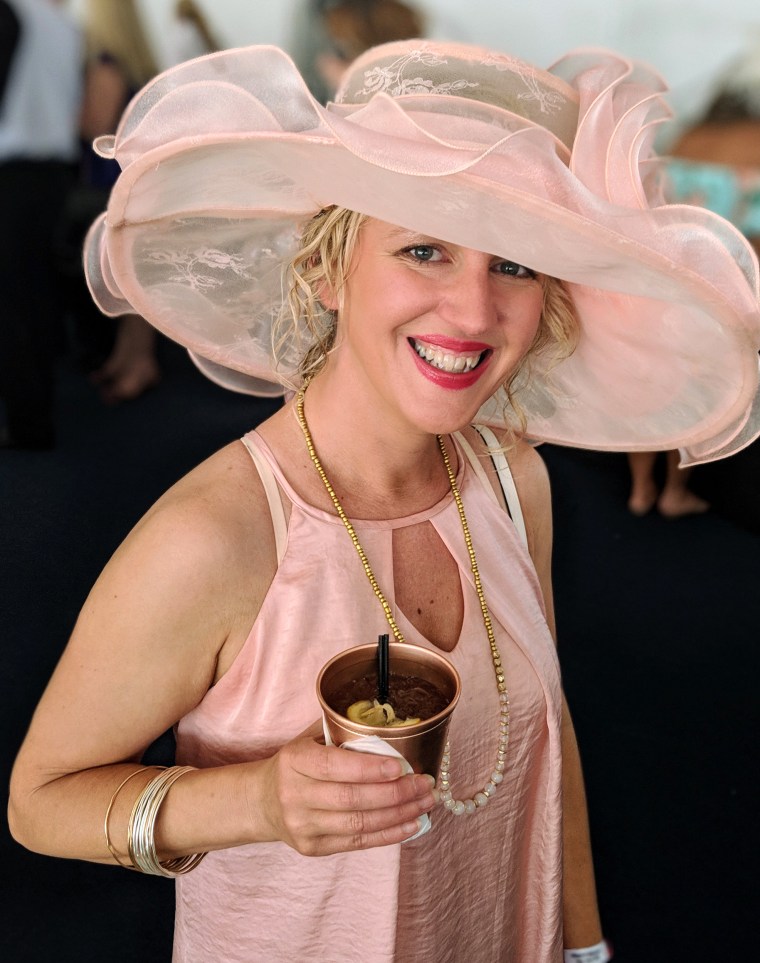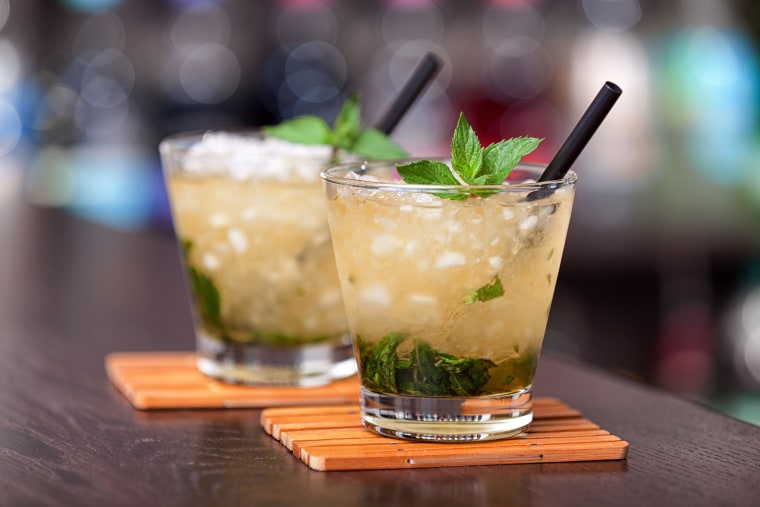It’s the last day of Dry January. That’s 31 days of no booze in the heart of bourbon country in my home of Louisville, Kentucky. More than that though, it’s 31 days of my feed overflowing with stories and think pieces about why seemingly everybody and their sister is — or is not — doing Dry January and why it is — or is not — a good idea.
I’ve seen it called “misguided at best,” a blow to the food and beverage industry, and “a month of people proving they’re not alcoholics.” I’ve also seen it heralded as a healthy start to the new year, bound to cause ripple effects for months in wellbeing. It’s annoying being part of something so trendy, something discussed ad nauseum, but I won’t lie, dropping booze the same month as so many other people made it easier.
Yes, it’s a gimmick. But it’s really hard to think about your relationship with alcohol unless you’re on a break. Here’s where I hasten to add that I don’t drink that much, although of course it’s all relative. Not that much compared to some of my bourbon country compatriots (and holy wow, can we throw it back here) is probably a lot compared to the average person, whatever that is.

The decision was made spur of the moment on Jan. 2 after watching a TODAY Show story on the trend. Not as a punitive measure for my overindulgence on New Year’s Eve, though let’s agree the Chambong is not an experience I need to repeat. Ever. I just wanted a reset, and the turn of a decade seemed fitting. My husband, also looking for a reset, joined me.
Then I remembered how stressful January is for a freelancer corralling tax stuff. And remembered I’m in the midst of a renovation. And remembered that Kentucky is a dreary, dripping place in winter. The reaction from almost everyone when I shared my intent on social media — which I did immediately, to hold myself accountable — was to joke (I think?) about reasons why I should wait till a shorter month, or find ways to cheat. Suddenly 31 days seemed like a long time.
So to keep my sober brain occupied I began to analyze what, specifically, prompts me to drink, and see if I could find other ways to meet the urge. In no particular order, here’s what I found.
I drink as ritual
When I started freelancing full time I had a hard time switching off every day. Without an office to leave, I was never not at work. A friend suggested I set working hours and make that that. So I did, and more or less stick to it. I close my laptop when my husband gets home from his job. We mark that passage of daytime/work time to evening/relax time with a drink. The sound of ice clinking into his glass is a Pavlovian signal that I can be off, I can just stop, with glass in hand.
So I continued the ritual. I used the same cocktail mixing glass, the same tools. I just swapped the beverage for alcohol-free creations. I can mix a decent bourbon cocktail, but the first mocktail I made — complete with homemade juniper syrup and fresh herbs — wasn’t balanced. “It’s missing something,” I told my husband. “Yeah,” he said. “Booze.”
I eventually simplified to a fizzy water with lime and bitters. It filled the need for ritual, but didn’t, of course, come with the pleasant glow of drink. Because, well, you know ...
I drink as shortcut
I’m not so good at relaxing. When something has me wound up — a work issue, a situation with my Airbnbs, a disagreement — it ricochets in my brain ceaselessly. Alcohol doesn’t make me forget — at risk of doth protesting too much, it really is one drink we’re talking here, or two, weeknights, anyway. But it softens the edges, or at least I’ve told myself it does therefore it does. It’s easier to pour a glass of wine than make myself face an issue head-on and work through it.
This month I faced things. Thought about them. Talked through them. And then if needed, self soothed with TV binges (The Marvelous Mrs. Maisel is as delicious as a tiki cocktail!). And in a stroke of good timing, I had downloaded the meditation app Calm near the end of the year. I got it for the bedtime stories, but started trying the 10-minute meditations. I’m not here to say that fixed my overwrought brain. But it reminded me I have an ability to dial it back, to breathe and come out the other side of something hard. And between the sleep stories and the no alcohol, I absolutely slept better.
I drink as social lubricant
Drink is the default where I live. Maybe where we all live. “You all should come by” is shorthand for “come drink with us.” I don’t feel I’m being hospitable if I don’t have several (several!) bourbons on offer, plus wine or beer. Now it’s not to get plastered. It’s tradition, a habit I’ve engraved in my psyche to greet people by asking, “what are you drinking?”
So this one was tough. I had friends over for mocktails. For a home-cooked dinner and board games sans drinks. We sipped endless Topo Chicos at a friend’s gathering. I met for coffee in the day instead of drinks in the evening, and even went to a bar for mocktails with fellow writer friends. And it was fine, actually. I’ve always had a theory that the more people change when they drink, the less happy they are with themselves. Drinking me is an amplified me, not a different me, so I found I didn’t need booze to have rousing conversations or enjoy being with friends (that’s a relief!).
But it wasn’t the same. Around here we genuinely, seriously love sitting around some pours of bourbon talking about them as that Kentucky hug warms our bellies. Our friends and my husband and I can spend all night sipping and comparing notes on this bourbon and that one, and I mean we literally take notes. We have blind tastings. We’re all on a bourbon journey here, and there’s little as exciting as finding a new favorite.
And we love hanging out at our neighborhood craft brewery. Old Louisville Brewery is the living room of our close-knit neighborhood, and we can always count on seeing friends and neighbors, or making new friends over a pint. And, I hate to say it, but I wasn’t going to waste calories on glasses of root beer. So maybe the naysayers had a point about Dry January hurting businesses.
So that will most likely be my first drink in (do we call it Wet?) February. It’s Super Bowl Sunday so we’ll go to the brewery and drink our beer because: America.
Life after Dry January
Will anything change for me? Was this just an experiment in willpower as some have said? I hope it’s more than that. Cutting booze wasn’t any health miracle for me. I don’t think I lost weight. I don’t look any different. Probably the most dramatic impact was on our budget (sorry for the slump in your sales, our corner liquor shop!). But I definitely liked the morning after effect. As much as I love bourbon, when we get into those tasting evenings my head hurts the next day and I’m tired. I don’t get much done.
A month in I’ve gotten over the hump and don’t have that automatic thought of pouring a drink at the end of the day. Post Dry January I’d like to have a drink if and when I actually want one, not just mechanically from habit. Will I slide back into that well-worn groove, though? Anyone who can put themselves in the hospital doing pull-ups is not the best at happy mediums so I can’t say.
But I’ve seen something encouraging. A lot of people, including around here, are talking about how much we drink, and whether it’s a good idea. A lot of companies — spirits brands, even bars here in bourbon country — are paying attention and offering alternatives worth drinking. It’s almost like we were all sort of sleepwalking along, bottle in hand, and have woken up and looked at the bottle and asked ourselves if it belongs there. The answer is different for everyone, and I can only speak for myself. But I’d like the default to be reaching — as a considered decision — for the bottle, instead of it already being there.
More from Dana McMahan
- My fitness resolution landed me in the hospital
- I love my child-free life. Why do other people have a problem with it?
- I said no to unpaid emotional labor by saying 'no' to this word
- Why hiring a house cleaner made me happier and more productive
Want more tips like these? NBC News BETTER is obsessed with finding easier, healthier and smarter ways to live. Sign up for our newsletter and follow us on Facebook, Twitter and Instagram.
